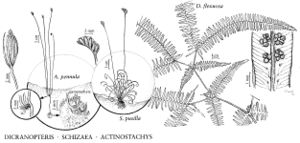Gleicheniaceae
Plants coarse, terrestrial. Stems long-creeping, forked, stele protostelic (a solid rod of vascular tissue with phloem surrounding xylem), covered with scales or hairs. Leaves monomorphic, large, scrambling or trailing, 1–many times forked. Petiole not articulate to stem, with pair of opposite pinnae and arrested bud at apex, or rachis continuing and producing 2 or more pairs of opposite pinnae. Pinnae 1–several times forked, with arrested bud at each fork; indument of simple, branched, or stellate hairs [scales]. Veins free, 1–4-forked. Sori round, indusia absent. Sporangia 2–many on slightly elevated receptacle, sessile to subsessile; annulus complete, transverse, medial, longitudinally dehiscent; spores 120–800 per sporangium. Spores all alike, whitish to yellowish, bilateral to globose, monolete or trilete, generally smooth without elaborately ornamented surface. Gametophyte borne aboveground, green, obcordate to elongate.
Distribution
Nearly worldwide in tropical to subtropical regions.
Discussion
Genera 4, species ca. 140 (1 genus, 1 species in the flora).
Selected References
None.
